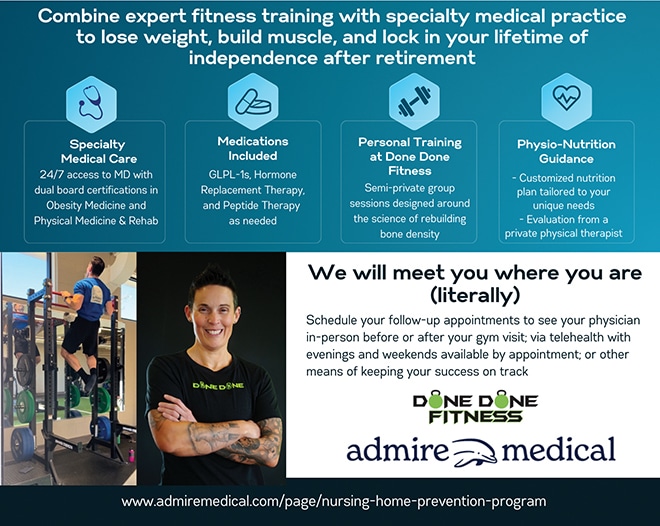Lifting: An Investment In Your Independence


By Alexander Watson, MD & Angela Barone, DNP
For many women who have worked hard to build successful lives and careers, maintaining independence through the pre-retirement and retirement years is a top priority. While you carefully manage your finances, household, and overall health, there’s another more specific priority you should target: bone density and muscle mass.
Recent medical research has revealed that strength training—particularly lifting heavy weights—isn’t just for athletes or bodybuilders. It’s a powerful tool for preventing the loss of independence that often comes with aging. Strength training directly improves bone density through mechanical loading; when you lift heavy weights, you’re literally telling your bones to get stronger while your muscles reinforce the message by pulling on the bones forcefully.
The LIFTMOR trial, a groundbreaking study, demonstrated that we can rebuild bone density at any age through proper strength training (emphasis on “proper”). This is particularly crucial for women, as they face accelerated bone density loss after menopause. The financial implications are significant: investing time in strength training now could help avoid the substantial costs of assisted living facilities or nursing care later—which in Delaware can exceed $10,000 per month.
Beyond bone health, strength training builds what medical professionals call “appendicular lean mass”—essentially, the muscle in our arms and legs. This muscle mass serves as a biological insurance policy against frailty and falls. Studies show that grip strength, which improves with exercises like deadlifts, is a reliable predictor of overall health and longevity. It’s not just about opening jars; it’s about maintaining the strength to catch yourself if you stumble or to push yourself up if you fall.
The key to success lies in proper form and progressive overload—gradually increasing weights as you become stronger. While working with a qualified trainer initially may seem like a luxury expense, it’s an investment in proper technique that can prevent injuries and ensure maximum benefits in the shortest time. Focus should be on compound movements like squats, deadlifts, and chest presses, which work multiple muscle groups simultaneously and provide the greatest return on your time investment. For those worried about an excessively “bulky” or muscular appearance, fear not—while building some muscle is the goal, you’re highly unlikely to develop a bodybuilder’s appearance without being in a big calorie surplus (and likely some anabolic steroid assistance, as well).
For optimal results, aim for three to four strength training sessions per week, with weights heavy enough that you can complete at most 8-15 repetitions before fatigue sets in. This isn’t about “toning” with light weights—real changes in bone density require substantial mechanical load. Some sets should be even heavier, causing you to reach failure after only 3-8 repetitions. These sets will focus more on strength than a mix of strength and muscle mass, and the heavier weights will provide a more potent signal for bone strengthening.
The benefits extend beyond physical strength. Regular strength training improves sleep quality, reduces anxiety, and helps maintain stable blood sugar levels. It’s also been shown to help prevent cognitive decline, another clear factor in maintaining independence as we age.
Consider this: while many of us don’t think twice about spending on anti-aging skincare or regular hair appointments, investing a few hours weekly in strength training could have far more impact on our quality of life in later years. The ability to travel independently, play with grandchildren, or maintain our own homes well into our seventies and eighties isn’t just about luck, it’s about the investments we make in our physical health today.
Remember, it’s never too late to start. Whether you’re 45 or 65, beginning a structured strength training program now can help preserve your independence and dignity in the years ahead. Consider it part of your long-term financial planning—an investment in avoiding the substantial costs, both financial and emotional, of dependent care in your later years.
For more information please call 302-592-4953, visit us online at www.admiremedical.com or scan the QR code in our ad with your smartphone.
Bios
Dr. Watson is a distinguished physician specializing in physical medicine & rehabilitation (PM&R) with a clinical focus on obesity medicine. During his residency, he explored the interaction between obesity and common “PM&R conditions” like back pain, arthritis, and neurologic disease. Angela Barone is a dedicated family nurse practitioner specializing in women’s health and HRT.
click www.admiremedical.com/page/memberships for a membership appointment
114 Sandhill Dr. Suite 201 Middletown, DE 19709
302-592-4953
follow them on instagram @admiremedical
and facebook @admiremedicalDE


